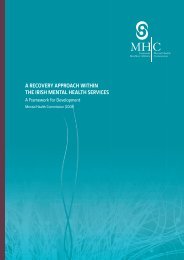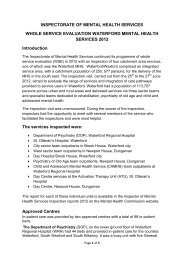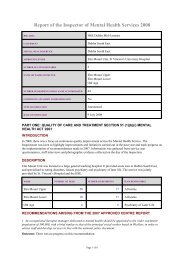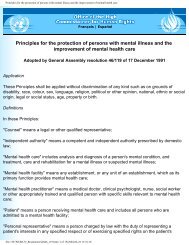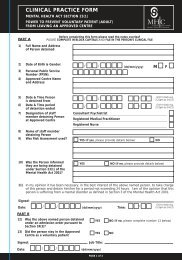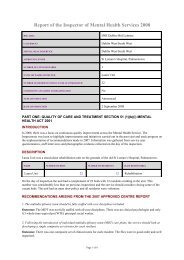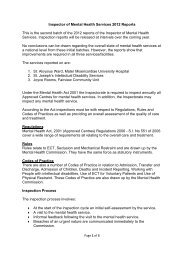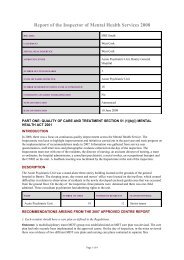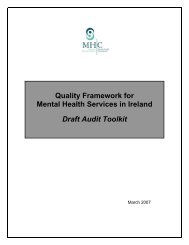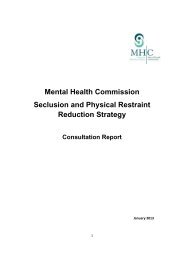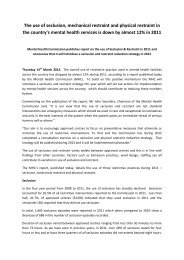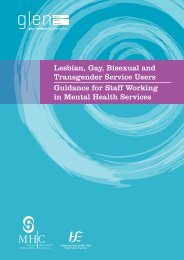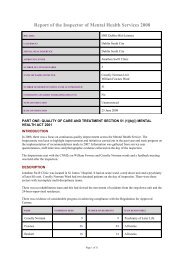Position Paper The Recovery Journey A Recovery Approach Within ...
Position Paper The Recovery Journey A Recovery Approach Within ...
Position Paper The Recovery Journey A Recovery Approach Within ...
- No tags were found...
Create successful ePaper yourself
Turn your PDF publications into a flip-book with our unique Google optimized e-Paper software.
THE RECOVERY JOURNEY –A RECOVERY APPROACH WITHIN THE IRISH MENTAL HEALTH SERVICES<strong>Position</strong> <strong>Paper</strong><strong>The</strong> Mental Health Commission was established in April 2002, pursuant to the Mental HealthAct 2001. <strong>The</strong> statutory mandate of the Mental Health Commission is:∆ To promote, encourage and foster the establishment and maintenance of highstandards and good practices in the delivery of mental health services and to takeall reasonable steps to protect the interests of persons detained in approved centresunder this Act (Section 33.(1) Mental Health Act 2001).<strong>The</strong> Mental Health Commission, in January 2006 issued a discussion paper A Vision for a<strong>Recovery</strong> Model in the Irish Mental Health Services. That discussion paper set out to achievethe following:∆ To review different perspectives on and definitions of recovery∆ To review models of best practice in recovery oriented services∆ To define the process of recovery∆ To consider how mental health services in Ireland could incorporate the concept ofrecovery into service deliveryFollowing publication of the discussion paper there was a response period where the viewsof interested individual and organisations were considered. Based on the interest in thediscussion paper and feedback received, the Commission has now prepared and issued aresource pack which contains the following publications:∆ <strong>The</strong> <strong>Recovery</strong> <strong>Journey</strong> – A <strong>Recovery</strong> <strong>Approach</strong> <strong>Within</strong> <strong>The</strong> Irish Mental Health Services,<strong>Position</strong> <strong>Paper</strong>, Mental Health Commission (2008)∆ A <strong>Recovery</strong> <strong>Approach</strong> within the Irish Mental Health Services – A Framework forDevelopment, Mental Health Commission (2008)∆ A Vision for a <strong>Recovery</strong> Model in Irish Mental Health Services – A Qualitative Analysis ofSubmissions to the Mental Health Commission, Mental Health Commission (2007)∆ A Common Purpose: <strong>Recovery</strong> in Future Mental Health Services, Social Care Institute forExcellence, Royal College of Psychiatrists, Care Services Improvement Partnership (2007)∆ Making <strong>Recovery</strong> a Reality, Sainsbury Centre for Mental Health (2008)3
THE RECOVERY JOURNEY –A RECOVERY APPROACH WITHIN THE IRISH MENTAL HEALTH SERVICES<strong>Position</strong> <strong>Paper</strong><strong>The</strong> Resource Pack was officially launched on 17th April, 2008, at a conference hosted bythe Mental Health Commission with the theme A <strong>Recovery</strong> <strong>Approach</strong> within the Irish MentalHealth Services – Translating Principles into Practice.A <strong>Recovery</strong> <strong>Approach</strong> within the Irish Mental Health Services – A Framework for Developmentsets out the views of the Mental Health Commission on recovery, as both a concept and practiceand how it can become an integral part of Irish mental health care services. Awareness of therecovery approach is a relatively recent development in the Irish mental health services. Mentalhealth services in Ireland, generally, are beginning to take on the challenge of incorporatingthe recovery philosophy into the organisation and delivery of services.<strong>Recovery</strong> involves focusing on strengths and opportunities rather than on the limitationsand symptoms of illness. <strong>The</strong> concept of hope and an optimism about outcomes are corevalues in the recovery approach.A recovery approach aims to support the person in their own personal journey. It involvesenabling and empowering the person to access their inner strengths and resources and onbuilding a meaningful, valued and satisfying life. <strong>Recovery</strong> is not just a personal process.Access to housing, income, education and social networks are all part of the recoveryjourney.<strong>Recovery</strong> is an ongoing and evolving process. Individual narratives by people who haveexperienced mental illness and are living well with their illness inform current thinking andpractices in recovery. <strong>The</strong> literature emphasises the importance of active involvement andpartnership with the service user. <strong>Recovery</strong> is not something that professionals do to theperson; it is a process that requires a personal commitment and involvement from theservice user.A <strong>Recovery</strong> <strong>Approach</strong> within the Irish Mental Health Services – A Framework for Developmentin outlining the Mental Health Commission’s position on the recovery approach, providesa framework for all stakeholders on how to integrate the recovery approach into theIrish mental health services. This paper, prepared by Dr. A. Higgins, for the Mental HealthCommission identifies six key concepts for developing a recovery approach:∆ Leadership∆ Person-centred and empowering care∆ Hope inspiring Relationships4
THE RECOVERY JOURNEY –A RECOVERY APPROACH WITHIN THE IRISH MENTAL HEALTH SERVICES<strong>Position</strong> <strong>Paper</strong>∆ Access and Inclusion∆ Education∆ Research/EvaluationLeadership“Leaders play an important role in setting the organisational culture and leading changein this area of practice by communicating a clear message of the relevance, importanceof, and their commitment to a recovery approach. If the predominant ethos is one ofbenign paternalism and illness orientation, or one that ignores the input of service usersat management and service development level, then a culture that ignores the principlesof recovery is likely to be fostered throughout the organisation. Equally, without a statedcommitment to the principles of individualism, choice, people may simply re-title currentpractice as recovery oriented”. 1&2Person-centered and Empowering Care“Essential components of a recovery oriented service are person-centered care and theempowerment of the person accessing the service. For mental health care to be personcenteredit needs to be delivered in a manner that is respectful of the person’s life story.Person-centered care focuses all outcomes on the person’s life – social, psychological,physical, cultural, sexual and spiritual – and provides the supports needed to maximizeautonomy, choice and self-determination (Mental Health Commission, 2007). A personcenteredand empowering service is also manifest by the active involvement of the personin his/her own care and treatment, which respects the person’s right to move forward athis/her own pace. As recovery belongs to the service user, it is the service user who defineswhat recovery is and what it entails, in the context of their lives”. 31A <strong>Recovery</strong> <strong>Approach</strong> within the Irish Mental Health Services A Framework for Development, Mental HealthCommission (2008)2ibid Page 143ibid Page 165
THE RECOVERY JOURNEY –A RECOVERY APPROACH WITHIN THE IRISH MENTAL HEALTH SERVICES<strong>Position</strong> <strong>Paper</strong>Hope Inspiring Relationships“<strong>The</strong> person to person interpersonal relationship is a central element of therapeutic workingand it is the relationship aspect of care that is most valued by service users. <strong>Within</strong> recoveryoriented relationships there is a commitment to engaging and developing hope-inspiringrelationships that acknowledge a common humanity between the professional, carer, serviceuser and family member. Mental health staff strive to work within a negotiation frameworkwith regard to care and treatment options and decisions (CSIP, RCPsych and SCIE, 2007).<strong>The</strong>re is a move beyond the traditional frame of reference of ‘power over’ and ‘responsibilityfor’, to a ‘power with’ and ‘responsibility with’ stance”. 4Access and Inclusion“<strong>Recovery</strong> is closely associated with social inclusion and having access to mainstreamservices which enable the person to take on meaningful and satisfying social roles insociety (CSIP, RCPsych and SCIE, 2007). Recovering from the stigma and discriminationassociated with a mental health problem can often be more challenging and debilitatingthan recovering from the difficulties themselves (Repper and Perkins 2002). Challenginginequalities, through addressing the cause and consequence of stigma, discrimination, socialand economic exclusion is central to recovery and the meaningful integration of people whohave experienced mental health problems into community life”. 5Education“Education is an important dimension of infusing a recovery approach into the culture andpractices of mental health services. Movement toward recovery principles fundamentallyrequires a change in mind and heart. Hence, educators are not just challenged todevelop ways of heightening awareness of recovery and recovery principles, they arealso challenged to deconstruct the current model of mental distress that focuses onillness and explore in an in-depth manner what constitutes true dialogue and partnership.Education needs to address the needs of service users, health professionals and membersof the general public”. 64ibid Page 185ibid Page 196ibid Page 216
THE RECOVERY JOURNEY –A RECOVERY APPROACH WITHIN THE IRISH MENTAL HEALTH SERVICES<strong>Position</strong> <strong>Paper</strong>Research /Evaluation“<strong>The</strong> provision of a quality mental health service is a central value underpinning the policydocument, ‘A Vision for Change: Report of the Expert Group on Mental Health Policy’(Department of Health and Children, 2006). A quality mental health service is one thatis based, among other things, on best practice and incorporates systems for evaluationand review (Mental Health Commission, 2007, 2005b). <strong>The</strong> Mental Health Commissionacknowledges that there is a need for better information about all aspects of recovery,and that research, evaluation and dissemination of best practice are essential to ensurethat developments are consistent, effective and worthwhile. Participative and emancipatoryapproaches to research and evaluation, utilizing different research paradigms and methods,have the potential to facilitate a deep understanding of the recovery process, identifyfactors that support recovery focused care and can be in themselves a support for recovery(Jacobson et al, 2005, Nelson et al, 1998)”. 7Advancing the recovery approach requires action both within the mental health servicesand in wider society.SERVICE DELIVERY AND RECOVERYA recovery-oriented mental health service empowers service users and family/carers and isbased on a partnership model of care and treatment. This involves creating opportunities tofacilitate the involvement of service users in all aspects of mental health service provision.Training initiatives which incorporate the experiences and input from service users provideone such opportunity.Government policy as enunciated in A Vision for Change (Department of Health and Children2006) places a strong emphasis on the need for a recovery orientation to inform all aspectsof the design, development and delivery of mental health services. A Vision for Changeproposes that all mental health care services must be based on a recovery approach. <strong>The</strong>full implementation of A Vision for Change will support the integration of the recoveryapproach within the Irish mental health services.<strong>The</strong> Mental Health Commission in furtherance of its statutory mandate, published in 2007,the Quality Framework: Mental Health Services in Ireland. <strong>The</strong> framework provides guidancefor service users, their families, carers and service providers on what to expect from aquality mental health service.7ibid Page 237
THE RECOVERY JOURNEY –A RECOVERY APPROACH WITHIN THE IRISH MENTAL HEALTH SERVICES<strong>Position</strong> <strong>Paper</strong><strong>The</strong> concept of recovery permeates the themes and standards within the Quality Framework.<strong>The</strong>se include:<strong>The</strong>me 1Standard 1.1Provision of a holistic, seamless service and the full continuum of careprovided by a multidisciplinary teamEach service user has an individual care and treatment plan that describes the levels of supportand treatment required in line with his/her needs and is co-ordinated by a designated member ofthe multidisciplinary team i.e. a key worker.Standard 1.3Each service user receives mental health care and treatment from a community based service thataddresses the person’s changing needs at various states in the course of his/her illness andrecovery process.Standard 1.5Service user recovery is facilitated by the provision of appropriate programmes based on identifiedneeds and delivered in the most appropriate environment.<strong>The</strong>me 2Standard 2.1Respectful, empathetic relationships are required between people usingthe mental health services and providing themService users receive services in a manner that respects and acknowledges their specific values,beliefs and experiences.Standard 2.2Service users rights are respected and upheld.Standard 2.3<strong>The</strong> mental health service promotes mental health and community integration of mental healthservice users.<strong>The</strong>me 3 An empowering approach to mental health service delivery is beneficial toboth people using the service and those providing itStandard 3.1Service users are facilitated to be actively involved in their own care and treatment through theprovision of information.Standard 3.2Service users are empowered regarding their own care and treatment by exercising choice, rightsand informed consent.8Standard 3.5Service users experience a recovery-focused approach to treatment and care.
eliefs and experiences.Standard 2.2Service users rights are respected and upheld.THE RECOVERY JOURNEY –Standard 2.3A RECOVERY APPROACH WITHIN THE IRISH MENTAL HEALTH SERVICES<strong>Position</strong> <strong>The</strong> mental <strong>Paper</strong> health service promotes mental health and community integration of mental healthservice users.<strong>The</strong>me 3 An empowering approach to mental health service delivery is beneficial toboth people using the service and those providing itStandard 3.1Service users are facilitated to be actively involved in their own care and treatment through theprovision of information.Standard 3.2Service users are empowered regarding their own care and treatment by exercising choice, rightsand informed consent.Standard 3.5Service users experience a recovery-focused approach to treatment and care.<strong>The</strong>me 6Family / chosen advocate involvement and supportStandard 6.1Families, parents and carers are empowered as team members receiving information and supportas appropriate.USING THE LANGUAGE OF RECOVERY<strong>The</strong> language used in mental health services can impede or facilitate the recovery journey.Raising awareness that some of the terminology used within the mental health services mayhave negative connotations is part of the recovery process. <strong>The</strong> reorientation of languageaway from illness-based towards a recovery based approach is a key challenge.RECOVERY AND PUBLIC ATTITUDES<strong>The</strong>re is growing acknowledgement that the burden of stigma and discriminatory practicesexperienced by people with a mental illness can prove to be a greater barrier to recoverythen the mental illness itself. <strong>The</strong> mistaken belief that a person with a mental illness willnot recover from this illness reinforces the stigma. Engaging with the media on how mentalhealth issues are portrayed and advocating for investment in mental health services help toinform public attitudes and promote recovery.9
THE RECOVERY JOURNEY –A RECOVERY APPROACH WITHIN THE IRISH MENTAL HEALTH SERVICES<strong>Position</strong> <strong>Paper</strong>THE HUMAN RIGHT BASED APPROACH TO RECOVERY<strong>The</strong> human rights perspective is of particular significant for service users. <strong>The</strong> Irish governmentis obliged under international human rights law to ensure that their policies and practicesin relation to the people with mental health problems conform to binding international law.<strong>The</strong> United Nations Declaration on Human Rights, together with the International Covenanton Civil and Political Rights (ICCPR) and the International Covenant on Economic Social andCultural Rights (ICESCR) form the International Bill of Rights. <strong>The</strong>se include a prohibitionon discrimination and provide that everyone has the right to the enjoyment of the highestattainable standard of physical and mental health.<strong>The</strong> promotion of the right to dignityand the need for affirmative action to protect the rights of persons with mental healthproblems places an obligation on the government to ensure that state policies and lawsserve to promote good mental health and prevent mental health problems.<strong>The</strong> Convention on the Rights of Persons with Disabilities 2006 marks a shift in attitudesand approaches to persons with disabilities. <strong>The</strong> Convention provides for respect forinherent dignity, individual autonomy including the freedom to make one’s own choices, andindependence of persons. “It takes to a new height the movement from viewing personswith disabilities as ‘objects’ of charity, medical treatment and social protection towardsviewing persons with disabilities as ’subjects’ with rights, who are capable of claiming thoserights and making decisions for their lives based on their free and informed consent as wellas being active members of society”.Reference: www.un.org/disabilities10
THE RECOVERY JOURNEY –A RECOVERY APPROACH WITHIN THE IRISH MENTAL HEALTH SERVICES<strong>Position</strong> <strong>Paper</strong>CONCLUSIONFuture mental health care service delivery must be firmly based on the concept and practiceof recovery. This is already enshrined in Irish mental health policy and is an integral elementof the Quality Framework in Mental Health Services (Mental Health Commission) (2007).<strong>The</strong> challenge ahead is to translate the ideals and aspirations of recovery into meaningfulclinical and management practice. It is only by so doing that the hope of all those affectedby mental illness for a return to a fulfilling life can be achieved.<strong>The</strong> Mental Health Commission is committed to:∆ Promoting the development of the recovery approach within the Irish Mental HealthServices∆ Ensuring that all Mental Health Commission publications advocate recovery approach∆ Promoting Irish based research on recovery∆ Working with other stakeholders in promoting recovery, ranging from training and educationto mental health service development to participation and integration in society.11



